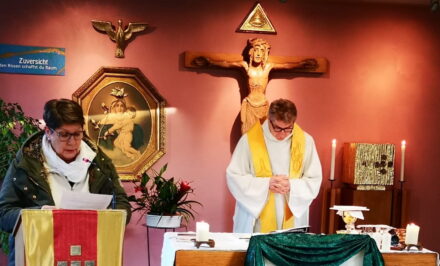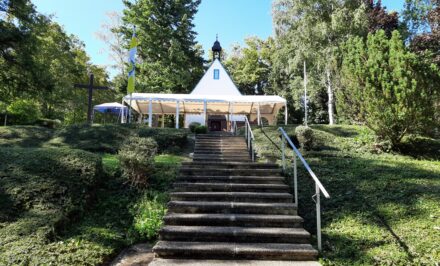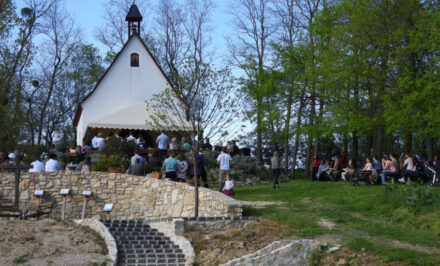 GERMANY, fma. “The weal or woe of thousands depends on the internal problematic of the leaders of our economy…” – a sentence in the closing discussion at the Conference of the International Kentenich Academy for Leaders (IKAF), in which the studies, papers, experiences and discoveries of three intensive days resounded – “… as well as on what we do for a culture of bonding.” Bonding as a structural force, a culture of bonding as a practical form of a covenant culture in leading a business. A good dozen business people and business leaders from Germany and Switzerland met from 11-13 November in Schoenstatt auf’m Berg, Memholz, Germany. This was the second time in which they had occupied themselves with Joseph Kentenich’s organism of bonding and pedagogy of bonding, and they were convinced that it was only a tiny beginning.
GERMANY, fma. “The weal or woe of thousands depends on the internal problematic of the leaders of our economy…” – a sentence in the closing discussion at the Conference of the International Kentenich Academy for Leaders (IKAF), in which the studies, papers, experiences and discoveries of three intensive days resounded – “… as well as on what we do for a culture of bonding.” Bonding as a structural force, a culture of bonding as a practical form of a covenant culture in leading a business. A good dozen business people and business leaders from Germany and Switzerland met from 11-13 November in Schoenstatt auf’m Berg, Memholz, Germany. This was the second time in which they had occupied themselves with Joseph Kentenich’s organism of bonding and pedagogy of bonding, and they were convinced that it was only a tiny beginning.
If you don’t want to organize a mechanism, but prefer to lead as many people as possible in the most organic way possible, you will need a sense for the uniting and formative power of love. This was the tenor of Fr Leonhard Erhard’s keynote address in which he showed that it is how God leads and forms humankind.
Personal attachments
 Already during the IKAF conference in May the participants – business people and economic leaders, as well as from the service sector – considered the subject of bonding and the organism of bonding intensively. In accordance with the way the IKAF works, by taking its bearings not only substantially, but also methodically, from Fr Joseph Kentenich, this subject had grown out of the observations of the participants at work and in things that happened in business. Continuing the subject organically and holistically, the subject of this conference centred on the practicalities of personal attachments.
Already during the IKAF conference in May the participants – business people and economic leaders, as well as from the service sector – considered the subject of bonding and the organism of bonding intensively. In accordance with the way the IKAF works, by taking its bearings not only substantially, but also methodically, from Fr Joseph Kentenich, this subject had grown out of the observations of the participants at work and in things that happened in business. Continuing the subject organically and holistically, the subject of this conference centred on the practicalities of personal attachments.
“Leadership is always a matter of forming a business and its workers.” This was Fr Leonhard Erhard’s thesis in his compact keynote address on Saturday morning. Leadership can take place through commands (mechanically), through good example, through an ideal, and through contact. While mechanical leadership through commands (or its insidious form of constraint through circumstances) may have a short-term effect – the recipient of the command is empty after carrying out the command, and then “waits inactively for the next command.” Organic leadership through contact (J. Kentenich) with “as many people as possible”, and “benevolence as the climate”, creates an area in which people can grow and be motivated from within. What people experienced when they were with Fr Kentenich was his caring and creative fatherliness, expressed among other things in the fact that time never played any role. Having been touched by his charism of fatherliness, the people who allowed him to lead them experienced an awakening of fatherliness in themselves, or “fatherliness in a motherly form”.
When the pressure of time and people weighs us down, what can grow
 “People have no immune system that can resist the power of love and the power of joy,” Fr Erhard stated.
“People have no immune system that can resist the power of love and the power of joy,” Fr Erhard stated.
When a deep personal attachment had grown out of a relationship with Fr Kentenich, who created an area of acceptance and affirmation free from pressure and expectations, he progressed to education and formation.
Today it is almost impossible to envisage working life today without pressure.
However, the pressure of time and people, the experience of objective or personal rejection, stifles, in the fullest sense of the word, what people can do. Fr Kentenich shows how it is possible to form people through personal attachment in a way that awakens their innate “talents”, and increases them.
Reverence or respect for a person’s God-given greatness and mission
 We need to read some of Fr Kentenich’s saying three times, and repeat them four times, before they reveal their full power. Let us take some sentences from his “Philosophy of Education”:
We need to read some of Fr Kentenich’s saying three times, and repeat them four times, before they reveal their full power. Let us take some sentences from his “Philosophy of Education”:
“Enlightened leadership knows that each individual is an original and incarnate thought of God … and has an absolutely personal and individual mission of love, that is modified by his or her personal disposition, inner inspirations, outer circumstances and God-given authority.”
It is the task of organic and holistic leadership to serve this mission and to develop it. To achieve this it has to try to recognize this mission and observe it reverently, to see how it shows and is formed. This is only possible, but it also becomes possible and practical, through contact, through personal attachment, and through “selfless service to another’s life”.
An hour spent reading Kentenich texts from the book for the Year of the Father Current, United with our Father, p. 75-78, became one of the most profound moments in this “direct contact with Fr Kentenich”, a weekend spent “struggling to come closer to him”, as Bettina Betzner expressed it.
“The IKAF has developed a working style”
 Sabine Merdes had been actively engaged in conducting the first two IKAF meetings, and was again present for the first time since then. Her impression was that “the IKAF has developed its own working style”. She summarised what all present had felt in some way when she spoke about “self-application”. All who attended this weekend applied the subject of a culture of bonding, attachment as a formative force, to themselves. “Before that has happened nothing can be passed on to others. Now we are going back to our businesses, and in six months our employees must tell us what has changed.”
Sabine Merdes had been actively engaged in conducting the first two IKAF meetings, and was again present for the first time since then. Her impression was that “the IKAF has developed its own working style”. She summarised what all present had felt in some way when she spoke about “self-application”. All who attended this weekend applied the subject of a culture of bonding, attachment as a formative force, to themselves. “Before that has happened nothing can be passed on to others. Now we are going back to our businesses, and in six months our employees must tell us what has changed.”
Self-application in a culture of bonding: a high degree of trust, openness and an absolutely personal way of dealing with one another, marked this weekend. “It is normal to talk honestly here”, Andreas Matt put it in a nutshell. “We are a working community, not a cuddly club,” Gertrud Jehle added. As a fruit of working together, of relating experiences, trying out things, asking questions, and searching together for answers, profound attachments were built up, while at the same time you could feel the tremendous expertise when observations were borne by great reverence and a genuine search for answers in Fr Kentenich’s spirit.
Touched by his charism
 “What does Fr Kentenich want to say to us, to me, at this moment – through his words, through the experiences of the participants, their contribution and exchange of ideas?” Bettina Betzner summed up in these words what she considered the root of this IKAF meeting. She saw the “question of being a shepherd” as the great subject, and the cultivation of “the awareness of being a shepherd” as the great task. Our own charism grows when it is touched by his. This weekend it became an almost tangible reality to us. His charism as a shepherd awakened what was possibly a hidden charism of a shepherd in one or the other participant. His charism to be the personal centre and to strengthen the personal centre, not only helped us to recognise the importance of a personal centre in an organic structure, but also to grow in the recognition: That is my strength and hence my task … As Gertrud Jehle remarked, “If we look at Fr Kentenich, we will discover elements of his charism in ourselves – and then it will grow.”
“What does Fr Kentenich want to say to us, to me, at this moment – through his words, through the experiences of the participants, their contribution and exchange of ideas?” Bettina Betzner summed up in these words what she considered the root of this IKAF meeting. She saw the “question of being a shepherd” as the great subject, and the cultivation of “the awareness of being a shepherd” as the great task. Our own charism grows when it is touched by his. This weekend it became an almost tangible reality to us. His charism as a shepherd awakened what was possibly a hidden charism of a shepherd in one or the other participant. His charism to be the personal centre and to strengthen the personal centre, not only helped us to recognise the importance of a personal centre in an organic structure, but also to grow in the recognition: That is my strength and hence my task … As Gertrud Jehle remarked, “If we look at Fr Kentenich, we will discover elements of his charism in ourselves – and then it will grow.”
You could feel on Sunday that the hour in the shrine on Saturday evening had a profound effect. It is actually natural that the meeting ended with the words: Father, our hand in your hand; our thinking in your thinking; our heart in your heart; your mission is our mission …
Photos
Translation: Mary Cole, Manchester, England













